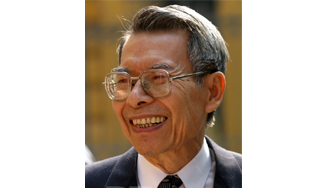
Professor Đoàn Thiện Thuật was born in Cự Lộc village, now Cự Lộc street, Nhân Chính ward, Thanh Xuân district, Hanoi. However, his father moved to Hàng Bát Sứ street to study classical Chinese from the age of 5. He lived there and later attended the Franco-Vietnamese School. He passed the entrance exam to the School of Interpreters with top marks and worked in the "treasury," which is the Department of Finance today. However, only a few years later, he became a private official and held high positions in various courts, leading a comfortable life. Thanks to this, all his children received a good education.
Doan Thien Thuat was the second of four brothers. His eldest brother had been involved in the Revolution since before the uprising, was imprisoned by the French, and later became a high-ranking official in the Ministry of Foreign Affairs. He had a positive influence on his younger brothers, especially his closest relative, Doan Thien Thuat. After the liberation of Hanoi, the young student Doan Thien Thuat was always a leader, playing an important role in student movements. By the end of his preparatory year for university, he was a member of the Central Executive Committee of the Vietnam Student Union. His younger brother was also on the Executive Committee of the Albert Sarraut School's Student Council.
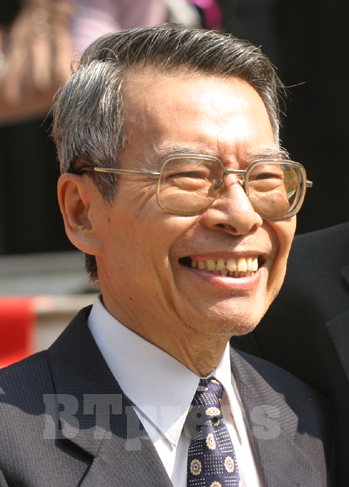
Professor, Doctor, People's Teacher Doan Thien Thuat
He was the Head of the Linguistics Department and concurrently the Head of the Linguistics Division in the Faculty of Literature (1977-1980; 1992-1995).
Passionate about extracurricular activities, Professor Doan Thien Thuat never neglected his studies. Whether in high school, pre-university, or later as a student at Hanoi University, he was always highly regarded for his conscientiousness and academic achievements. He was a student in the first cohort of Hanoi University (at that time, a cohort only lasted three years, but he was the only one to earn a four-year degree). After becoming a lecturer, he was slated to pursue postgraduate studies in the Soviet Union. He voluntarily attended the fourth-year program and completed his thesis like any other student to earn his four-year degree with distinction. Only then could he meet the requirements to submit his application. To this day, whenever his classmates talk about Professor Doan Thien Thuat, they all offer a brief description of him as a remarkable person.studious, careful, serious, creative...
With habits cultivated since childhood, coupled with a busy lifestyle balancing extracurricular activities and studies, Professor Doan Thien Thuat still dedicated significant time to self-study while teaching, achieving his Associate Doctorate (or Doctorate as it's called today) relatively early compared to his peers.
Professor Doan Thien Thuat has a very professional work ethic and a unique teaching style that is serious, thorough, and clear. Phonetics is often considered a dry and difficult subject, but his lectures are still light and engaging. In his teaching, he pays a lot of attention to practical application. He has sparked students' interest in exploring unanswered questions and encouraged their eagerness to learn and research.
My teacher often said, "Self-study is paramount." During the war against the Americans, in Dai Tu district (Thai Nguyen province), he lectured on the theory of phonology. And during those same months, under the dim light of an oil lamp, he completed the manuscript of his book.Vietnamese phoneticsThe professor devoted all his efforts, bringing together everything he had accumulated and, in particular, re-examining all issues in the light of Oriental studies, which Professor Nguyen Tai Can had contributed after years of exposure to Soviet linguistics.
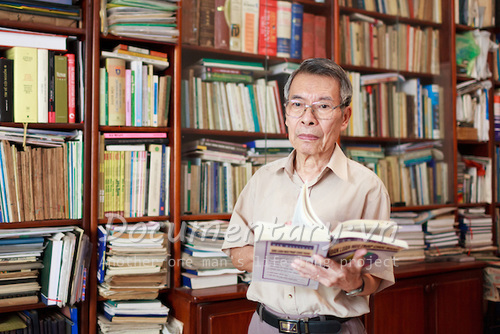
Through his teaching and scientific research, Professor, Doctor, and People's Teacher Doan Thien Thuat has made significant contributions, helping to lay the foundation for the field of linguistics in Vietnam. /Photo: Thanh Long
The teacher understood the boundary between morphemes and syllables. However, he didn't stop at the initial consonant and final vowel as in traditional Chinese theory. He was concerned with the practical reality of using the Vietnamese Quốc ngữ script and teaching in schools, so he felt compelled to delve into smaller units. He also didn't disregard the important element connected to the syllable, the tone, unlike Western researchers (who don't consider tone as a phoneme) and even traditional Northern phonology books. He distinguished three direct components of a syllable: the tone, the initial consonant, and the vowel part. Then he discussed the smaller elements that make up the vowel part. This is the novelty of the book.Vietnamese phoneticsThat's where its difference from previous textbooks lies. It also stems from the characteristics of the Vietnamese language, which is not an inflectional language but asserts that initial and final consonants are separate units, belonging to two independent systems, and does not accept the concept of positional variation of the same phoneme. This also reflects the uniqueness of the Vietnamese language. Upon its publication, this book caused a great sensation both domestically and internationally. It is a document frequently cited in dissertations and research papers and mentioned at many international scientific conferences. The book has been reprinted numerous times and is currently the basis for compiling textbooks in schools across Vietnam, at both university and secondary levels.
In addition to teaching, scientific research is an equally important task at a university. From his early field research on the Muong language in Ngoc Lac, Thanh Hoa, to later through supervising student internships, Professor Doan Thien Thuat has developed a training model:Using real-world examples to support teaching..
When the school evacuated to Thai Nguyen, the local government (then the Viet Bac Autonomous Region) requested the school's help in resolving a difficulty: selecting a standard version of the Tay and Nung languages for broadcasting, a task previously attempted by experts without success. The Linguistics Department launched an initial month-long exploratory mission, subsequently deciding to send students along for research. One or two professors took all fourth-year students, separated from the school, to areas inhabited by the Tay and Nung people, where they lived with local families to learn the language, while simultaneously attending daily specialized study sessions. This "field learning" format was implemented annually in a different province. Simultaneously with the fourth-year students, lower-year students, during their annual internships, spread out to collect materials in the remaining localities within the autonomous region. These materials were then passed on to final-year students for their graduation theses. (Professor...) Doan Thien Thuat personally managed the "field study" sessions and guided all fourth-year students in defending a collective thesis and constructing a linguistic atlas. He used mapping methods from Geographic Linguistics to identify areas where local dialects share similar phonetic and lexical characteristics.
All the fourth-year students in the following cohort also participated in a collective graduation thesis under the guidance of Professor Thuat. A quantitative method was applied to accurately identify the phonetic and lexical prevalence of the local dialects that had been determined in the previous work. The prevalence of each dialect was also shown on a map.
The local dialect that was discovered was used for broadcasting. The Tay and Nung people in most of the Viet Bac region understood and accepted it. This was a very noteworthy success.
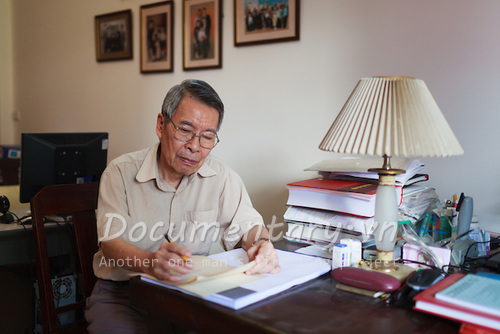
Professor, Doctor, and People's Teacher Doan Thien Thuat is a shining example of a teacher and researcher deeply involved in life. /Photo: Thanh Long
Previous experts followed traditional methods, choosing the language of the region with the highest level of economic, political, and cultural development as the standard language. This approach was based on several factors.outsideLanguage. It was unsuccessful, because in reality, no region in the Viet Bac area excelled in these aspects, and if there were, it would be a region with a majority Kinh population and a mixed dialect. The approach taken by Professor Doan Thien Thuat of Hanoi University was based on the similarities between local languages, that is, on these factors.insidelanguage. This is a methodological contribution of a general theoretical nature to linguistics.
These two sets of linguistic maps are the first two atlases ever produced in the field of linguistics in our country.
For five years, Professor Doan Thien Thuat traveled back and forth, from Dong Van, Quan Ba, Meo Vac, Hoang Su Phi to Ban Gioc (Trung Khanh), working tirelessly with students to complete his research project.Determining the standard pronunciation of the Tay Nung language.It is no coincidence that in the 1970s, the Linguistics Department of Hanoi University was highly regarded. The university chose this topic to participate in the National Economic Achievements Exhibition at Giang Vo during that period.
As soon as the bombing in North Vietnam subsided, a new research topic was launched. At the request of the Central Committee for the Protection of Mothers and Children, Vietnam needed to establish indicators for the psychophysiological development of children. The Ministry of Health was responsible for the physiological aspects, while the psychological aspects were handled by various agencies, including linguistics, with the Linguistics Department of Hanoi University conducting the investigation. For three years (1971-1974), the faculty and students embarked on a new campaign, still under the overall command of Professor Doan Thien Thuat. Annual practical sessions for lower-level students and a large portion of graduation theses focused on investigating the actual language development of preschool children. Professor Doan Thien Thuat discussed and assigned tasks to his colleagues for research and writing, while also directly guiding students to kindergartens and families to record pronunciation and vocabulary achieved by children at each age. The scope of the investigation included children in cities, rural areas, mountainous regions (Lao Cai), plains (Hung Yen, Hanoi), and coastal areas (Quang Ninh). The teachers and students once again traveled back and forth across the country. On this occasion, the teacher also participated with doctors from the Institute of Otolaryngology in investigating the language of children with disabilities. The results of this investigation, along with the papers by the teachers and students, were published in the Psychology Conference (in the proceedings).
Professor Doan Thien Thuat used his expertise to conduct practical research wherever needed. He collaborated with the Institute of Otolaryngology in speech audiometry and with the Voice of Vietnam Radio in measuring speech clarity at the end of the transmission line. His students later participated in other projects.speech recognitionIts applications are enormous (in criminal law, military affairs, counter-terrorism, etc.). In short, more than anyone else, the professor has seen the applications of Phonetics alone (not Linguistics in general) in medicine, engineering, technology, performing arts (film, theater, vocal music), and creative arts (poetry). Therefore, he resolutely rejects the idea that Linguistics is only a part of literary studies.
Professor Doan Thien Thuat, with his outwardly gentle and quiet demeanor, was in fact a very energetic person. It can be said that Professor Doan Thien Thuat was a teacher and researcher deeply involved in life. Before 1975, his footprints could be found from the northernmost point of the country to the Ben Hai River. After the liberation of South Vietnam, he traveled from Ca Mau Cape to the Ben Hai River, when he was assigned to lead an inter-ministerial survey team (comprising representatives from the Ministry of Higher Education, the Ministry of Education, the Ministry of Culture, and two ministerial-level agencies: the Central Committee for Ethnic Minorities and the Central Committee for Organization) established by the Government to verify the requests of ethnic minority communities in the southern provinces who wanted to learn their languages and scripts, in order to determine the state's language policy. Professor Doan Thien Thuat was appointed to this task because, at that time, he was the only researcher specializing in ethnic minority languages and was widely known. But it was this trip that allowed him to gain the earliest understanding of the overall picture of ethnic minority languages in South Central and Southern Vietnam, paving the way for his research in this field.
Several years later, within the framework of scientific cooperation between the Institute of Oriental Studies of the Soviet Academy of Sciences and the Institute of Linguistics and universities in North Vietnam, several joint field surveys were conducted to collect data on the languages of ethnic minorities in the South. Professor Doan Thien Thuat, along with his Vietnamese and Russian colleagues, enthusiastically researched the Cham language of Thuan Hai, the Cham language of Chau Doc, and especially the Southern Khmer language, which he had already learned from participating in the inter-ministerial survey team. Unfortunately, the manuscript of the book on the Southern Khmer language, which he co-authored with A. Ju. Efimov, was completed and awaiting publication in Moscow when the Soviet Union collapsed, so it was lost and the cooperation program was discontinued. These activities further solidified Professor Doan Thien Thuat's commitment to this field of research. Professor possesses extensive knowledge and a broad understanding of the entire country, but more importantly, he has supervised numerous graduate theses in various languages, from Xinh Mun to Khmu, training a generation of highly skilled students. These students are now leveraging their strengths in key positions at universities and research institutes nationwide.
Professor Doan Thien Thuat's proactive and energetic nature was evident everywhere and in every situation. When Vietnamese-French relations improved, he was appointed a visiting professor at the University of Paris VII. Professor Doan Thien Thuat took advantage of this opportunity to learn, research, and collect materials. He registered to study at Professor Gsell's Experimental Phonetics Laboratory at the University of Paris III, preparing to defend his French national doctorate (equivalent to a Doctor of Science in the Soviet Union). He paid his tuition regularly, even after returning to Vietnam. However, the plan fell through because the Vietnamese government did not recognize French degrees. Vietnamese French language trainees who successfully defended their third-level doctorates (equivalent to a PhD in the Soviet Union) had to retake the exams upon their return. In France, Professor Doan Thien Thuat became a close colleague of Professor A.G. Haudricourt, a world-renowned expert in historical phonetics with applications to languages in Indochina and Oceania. He was also acquainted with Professor M. Ferlus. Professor Hoang Xuan Han had given him Bento Thien's handwritten documents to write a research paper on the 17th-century Vietnamese Quốc Ngữ script, which was published in a journal at the University of Paris VII. He also kept the book as a memento of his teaching days at that university.Speak VietnameseWith permission from the Vietnamese embassy, Professor Doan Thien Thuat joined the Vietnamese Association in France, writing for the newspaper Doan Ket, participating in the association's activities, and even borrowing films from the embassy to organize film screenings for students at his school. In addition, Professor Doan Thien Thuat also asked a professor from his faculty to introduce him to the archives of the Foreign Missions Society to access documents. There, he was able to see firsthand letters sent from Vietnam to France and vice versa, between parishioners and their superiors, as well as notebooks of priests, with clearly recorded dates, spanning from the late 17th to the early 19th centuries. These are rare and valuable documents about the Vietnamese Quốc ngữ script, because until then, only documents from the 17th and 19th centuries were known, except for "Book of Records of Events" by Philip Binh (1822), written in Portugal, whose writing style he probably brought with him when he left, decades earlier. The documents that Professor Doan Thien Thuat found and brought back to Vietnam filled a century-long gap in documentation. The professor published these 42 letters in a substantial book titled...18th-century Vietnamese Quốc ngữ script.
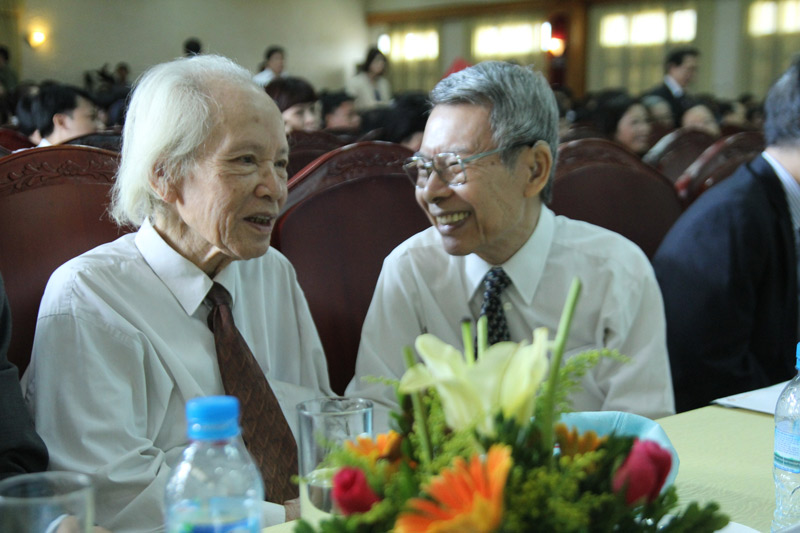
Professor Dinh Xuan Lam and Professor Doan Thien Thuat at the opening ceremony of the 2012 academic year at the University of Social Sciences and Humanities.
The time Professor Doan Thien Thuat spent in France (1981) collecting these documents coincided with the time Professor Phan Huy Le was working in France and brought back the complete set of materials to Vietnam.Complete History of Dai Vietengraving18th Republic(1697). The two professors lived together in the university dormitory and traveled together, so it is not surprising that later, when the Center for Vietnamese Research Cooperation (later becoming the Center for Vietnamese Studies and Cultural Exchange, the predecessor organization of the Institute of Vietnamese Studies and Development Science) was established, Professor Phan Huy Le was the Director and Professor Doan Thien Thuat was the Deputy Director, one mainly handling foreign affairs, the other mainly handling domestic affairs.
The center attracted a large number of foreign scientists and researchers. They came to Vietnam to learn about the country and its people in depth, but whether they wanted to or not, they had to cross the language barrier. Teaching them the language was indispensable and an urgent requirement. Professor Doan Thien Thuat was responsible for organizing classes, recruiting teachers, and providing teaching materials. On the other hand, internally, this was also a necessary source of income for the center's long-term survival, and the cost of hosting guests was very high, while there was no investment from the State throughout its 15 years of operation. Professor Doan Thien Thuat built a solid team of over 10 teachers, recruited with rigorous requirements regarding academic qualifications and pronunciation. He systematically trained them in teaching methods and handling situations. He organized the writing of books and engaged everyone in this work to enhance their skills. These books, later published under the name of the Institute of Vietnamese Studies and Development Science, were actually compiled over a long period before the Center's term ended, covering all levels from beginner to advanced.VietnameseLevel A, 2 volumes,Practice VietnameseLevel BPractice VietnameseLevel C,Simplified Vietnamese Grammar(In English, for foreign teachers of Vietnamese). Professor Doan Thien Thuat devoted all his efforts to this work, from planning, proposing content, requirements, assigning tasks, to reviewing articles and even finding funding, as well as handling illustrations and printing techniques. The book has been continuously reprinted and is used in most Vietnamese language schools for foreigners in Northern Vietnam.
In the field of linguistics, and leveraging his strengths, Professor Doan Thien Thuat has also established international cooperation plans. Leiden University in the Netherlands has collaborated with the Center for Cooperation to publish data on the languages of ethnic minorities in our country. The book...Dao languageThe book by Professor Doan Thien Thuat (co-authored with Professor Mai Ngoc Chu) was published with funding from the Netherlands. This was followed by the book...Katu language – word formationby Dr. Nguyen Huu Hoanh. And if there hadn't been any changes from the Dutch side, the third volume,Vocabulary of the Ede dialectsThe work of Associate Professor Dr. Doan Van Phuc is also published in this book collection as well as subsequent books. Professor Doan Thien Thuat had to find another way to get Doan Van Phuc's book published (with the sponsorship of the Center for French Language and Civilization and the French Embassy in Vietnam).
Following his collaboration with the Netherlands, Professor Doan Thien Thuat collaborated with South Korea. He taught at Hankuk University of Foreign Studies and co-authored an advanced Vietnamese language textbook with Professor Cho Jae-hyun, which was later published in Seoul. During his brief time teaching there, he also studied Korean and its written form with Professor Kim Ki Tae, resulting in a book titled...Speak KoreanThe book was published as a co-author with the two professors. It was taught in Vietnam during the early years when contact with Korea was not yet widespread.
In 2004, the Center's term ended, but that didn't mean Professor Doan Thien Thuat's workload increased. His pace of work intensified. One doctoral dissertation was defended, and another, a phonetics dissertation he supervised, was in its final stages. He participated in numerous conferences reviewing textbooks for educational reform, specifically for the Vietnamese language subject in primary schools, all as chairman. Following that came the project to write books for Vietnamese children abroad, a massive undertaking that had been conceived for many years but was only now being implemented.Vietnamese FunThe series comprises six levels, with three books in each level, edited by Professor Nguyen Minh Thuyet. Professor Doan Thien Thuat gladly accepted the invitation to participate. This is in addition to his research, writing, and participation in international scientific conferences. The professor presented the keynote address at the "International Conference on Latinization of Taiwanese Script," organized by National Cheng Kung University, Taiwan. Professor Doan Thien Thuat also presented a paper at the International Conference on "Southeast Asian Cultural Values – Preservation and Promotion" on October 12-13, 2005, in Siem Reap, Cambodia.
From the beginning of his university teaching career until his retirement years, nearly half a century, Professor Doan Thien Thuat made significant and effective contributions to the research and training of linguistics. Besides Hanoi University, he taught at Viet Bac Pedagogical University, Vinh University, and Ho Chi Minh City University when they were newly established; in language teacher training courses on linguistics organized by the Ministry of Higher Education; by Thanh Xuan Foreign Language University (now Hanoi University); by the University of Foreign Languages Education; at Nguyen Du Writing School; in training courses for reporters of Nhan Dan newspaper and Vietnam News Agency; and in postgraduate courses of the Institute of Linguistics and Hanoi Pedagogical University. He also participated in the Scientific Council of the University of Social Sciences and Humanities, Vietnam National University, Hanoi; the Language and Foreign Languages chuyên ngành Council; and the Scientific Title Council of the Ministry. Professor Doan Thien Thuat also served on the Executive Board of the Vietnam Linguistics Association for the first two terms.
Thus, through teaching and scientific research, Professor Doan Thien Thuat, along with several other scientists, laid the foundation for the field of linguistics in Vietnam. Generations of students trained by him are continuing his work, developing it in many aspects and on a large scale. Many of them have now become reputable scientists, managers, and leaders in research institutes, universities, and agencies from the central to local levels.
|
PROFESSOR, DOCTOR, PEOPLE'S TEACHER DOAN THIEN THUAN
+ Workplace: Faculty of Literature (Hanoi University). + Management position: Head of the Linguistics Department and Head of the Linguistics Division in the Faculty of Literature (1977-1980; 1992-1995).
Vietnamese phonetics, University and Vocational High School Publishing House, 1977. Vietnamese script in the 18th century(Compiled and edited by) Education Publishing House, 2008. Dao language, Social Sciences Publishing House, Hanoi, 1992. Tay-Nung Language in the North of Vietnam,Tokyo University of Foreign Studies Press, Japan 1996. The Vietnamese language book series for foreigners consists of 4 volumes.Vietnamese Practice A, volumes 1 & 2;Vietnamese Practice B;Vietnamese Practice C;An concise Vietnamese Grammar), World Publishing House, Hanoi, 2004 (8th reprint).
+ State Award for Science and Technology in 2010 for the bookVietnamese phonetics(University and Vocational High School Publishing House, 1977). |
Author:Assoc. Prof. Dr. Pham Van Tinh